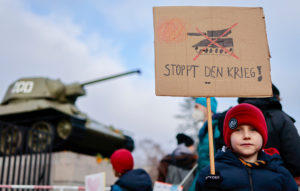Palestinians deserve a better leader than Mahmoud Abbas. Last month, the president of the Palestinian Authority visited Germany, a country on whose donations his quasi-government depends. At a press conference two weeks ago with Chancellor Olaf Scholz, a German journalist asked Abbas whether he wished to apologise for the massacre of eleven Israeli athletes during the Munich Olympics of 1972. After all, the attack, carried out 50 years ago today, was organised by a group linked to Abbas’s al-Fatah party. Here was a chance to look magnanimous on a world stage.
Instead, Abbas launched into a tirade about Israeli crimes, saying that Israel had committed not only “50 massacres” but, in fact, “50 Holocausts”. The visibly annoyed Scholz did not think on his feet quickly enough to contradict Abbas’s relativisation of the Holocaust. Somewhat surreally, after Abbas had finished the two men shook hands and walked off.
Outrage was quick to follow. Abbas backtracked on his statement, and Scholz publicly stated his anger at what Abbas had said. Some German commentators suggested that Germany should rethink its funding for the Palestinian Authority. That idea did not gain traction. After all, the Palestinian Authority governs over those dense population centres in the West Bank that Israel, the occupying power since 1967, does not wish to govern itself. Germany’s funding of the corrupt, inefficient, and undemocratic Palestinian Authority is in Israel’s interest. Ironically, yet largely unbeknown to the outraged German Twitterati, defunding Abbas is a demand that many of Israel’s strongest critics would happily get behind.
As much as it likes to claim the role of the peace-seeking outsider, Germany is deeply entrenched in the Israeli-Palestinian conflict. This is not only because of the importance of the Holocaust to the creation and self-understanding of the Jewish state. Germany played an important role in the conflict via its crucial economic, financial, and military support of Israel, especially before 1967. But the 1972 terrorist attacks, and Germany’s relationship with them even 50 years on, throw a spotlight on Germany’s true role in the Israeli-Palestinian conflict — and its connected efforts to whitewash its barbaric past.
Munich was the second time Germany had been invited to host the Olympics. The first invitation came after the First World War, the follow-up after the Second. Both times, the idea was to symbolically welcome Germany back into the circle of “civilised” nations. When, in 1931, Germany was awarded the games to be held in 1936, the Olympic Committee did not envisage the imminent rise of Adolf Hitler to power. The infamous Nazi Olympics became a showcase for Nazi power and ideology. Jews were largely barred from participating.
In 1972, with Social Democrat and former Nazi opponent Willy Brandt in power, the danger of Germany backsliding into Nazism seemed remote. The Federal Republic appeared to be firmly entrenched in the Western bloc. It was also becoming a more autonomous player on the world stage via Brandt’s Russia-embracing Ostpolitik (itself a policy under much scrutiny these days). For West Germany, the 1972 Olympics were another milestone on the road to normalisation, and an occasion to show the world the friendly face of the “new” Germany.
There was, however, something schizophrenic about this effort. Twenty-seven years after the German defeat, most former Nazis and their legions of enablers were still alive. More than that, they were respected members of society. Post-war Germany had normalised its Nazis even before the world had normalised the new Germany. The bureaucrats, professors, diplomats, teachers, journalists, and captains of industry on which the West German state was founded all too often were compromised figures.
And it could not have been otherwise. The main reason Western allies never saw denazification through was that getting rid of the Nazis would have meant crippling the German state to such a degree that it would have been unable to fulfil its function as a frontline state in the Cold War. The Cold War enabled the survival of the German state at the cost of letting most perpetrators go unpunished. Most recently, David De Jong’s new book Nazi Billionaires shows to what extent Germany’s tycoon families owe their wealth to their involvement in Nazi crimes. His study is the latest of historical efforts to show the extent to which the new Germany was built on the old.
Due to the manifold continuities of Nazism in the new republic — not least in terms of lingering antisemitic and racist attitudes and an only slowly-eroding authoritarian mindset — West Germany needed to signal to the outside world a democratic and civil character. While this was especially true of the immediate post-war years, virtue signalling to the outside world has long become part of the German foreign policy package (a tough pursuit of economic interest being the other and more important part).
And so, in 1972, the German hosts wanted to organise Games that were opposite in spirit to those of 1936. Instead of demonstrating the superiority of the master race, the Olympics were meant to showcase the newfound German pacifism. And this they did, uncompromisingly so. Die heiteren Spiele — the joyous games — went the official slogan. To ensure that nothing disturbed the joyousness, German security guards at the Olympic village were unarmed and dressed in light blue suits, the literal opposite of the black-clad and armed SS-men patrolling the grounds in 1936.
By today’s standards, the lack of security measures was baffling. About as baffling as passengers smoking on a plane, or, for that matter, smuggling guns onto a plane and hijacking it. After all, these were the Seventies, a golden age for anti-colonial and radical Left-wing terrorism. As archival research by journalists of German magazine Der Spiegel revealed, German security services were warned of potential terrorist plots on the Games. However, no effort was being made to increase security measures. Showcasing the peacefulness of the new Germany took priority over safety concerns for Israeli athletes.
On the morning of September 5, eight members of Black September climbed the walls of the Olympic compound and proceeded to the quarters of the Israeli team. They killed two athletes and took nine Israelis hostage. The next day, after a catastrophically botched German rescue mission undeserving of its name, all Israelis had been killed by the terrorists. One German policeman was dead, as were five of the eight Palestinians. Zvi Zamir, chief of the Israeli intelligence agency Mossad, was present at the final shootout. “They didn’t make even a minimal effort to save lives,” an exasperated Zamir reported. Zamir was shocked to realise that the German priority had been to continue the Games with as little interruption as possible. Surprisingly and bizarrely, the “joyous Games” had remained uninterrupted almost throughout the whole hostage crisis. While the Israeli team left the Games, the rest of the world continued with the competition.
Two months later, Black September hijacked a Lufthansa plane in Beirut and blackmailed Germany into releasing the three surviving members of the Munich squad. Israel had warned Germany of such a scenario and had asked Bonn not to give in to terrorist demands. Germany did the opposite and expedited the three Palestinian prisoners to Colonel Gaddafi’s Libya, where they were given a hero’s welcome. Israel was furious. Germany, its crucial ally, had not only refused Israeli help and advice during the Munich hostage crisis but had acted against every principle of Israeli counterterrorism policy.
The attack by Black September was an attack not only on the Israeli team but implicitly also on the political rationale behind the games. Black September named its operation “Ikrit and Biram” after two Palestinian villages razed to the ground after the Arab-Israeli War of 1948, and whose inhabitants were banned from returning. All of a sudden, Ikrit and Biram were violently forced into one historical equation with Munich, the birthplace of the Nazi movement, and nearby Dachau, the first concentration camp on German soil. This was a brutal collision of different historical events and logics. A terror attack rooted in the Israeli-Palestinian conflict took on a new meaning: Jews were murdered in what was meant to be the new Germany. And more than just a historical footnote in this context is the fact that Black September was aided in its preparations by a known German neo-Nazi.
The Munich attacks and Israel’s uncompromising retaliation mission in its aftermath have been covered in academic writing, a Steven Spielberg movie, and the Oscar-winning 1999 documentary One Day in September. It is the stuff of Cold War spy thrillers. Less attention has been paid to the German role in the whole affair. One question is why Germany had been so insensitive to Israeli wishes and opinions throughout the crisis. Germany had widely been considered a key ally of Israel up to that point, and for good reason. However, wondering why Germany had acted irresponsibly towards Jewish lives on its soil misses the original point of West Germany’s pro-Israeli orientation. This point was explained by former chancellor Konrad Adenauer on primetime German television in 1966: “We had done to the Jews so much injustice, committed such crimes against them that somehow these had to be expiated or repaired if we were at all to regain our international standing… Furthermore, the power of the Jews even today, especially in America, should not be underestimated.”
Here, as well as on other occasions, Adenauer stated clearly that the goal behind Germany’s support of Israel was rehabilitation — regaining international standing. That goal is then intertwined with a core idea of modern antisemitism: supposed Jewish influence over world affairs. To Adenauer, this was a natural thing to say to the German public as late as 1966. Rehabilitation, whitewashing the past, faking democracy — whatever you want to call it, the Federal Republic consistently prioritised its international reputation over domestic efforts at working through the past.
Belatedly, the German government is seeking to make amends for its 50-year old failure to protect its Israeli guests. Last week, a €28 million compensation deal was finally agreed with relatives of the Israeli victims. No amount of compensation, however, can undo history.
What Black September did in September 1972 was to crash a German party that was all about celebrating and showcasing a novel Germany to the world. And the German response to the terrorist attack was guided by one overarching desire: to throw the party crashers out the door and to continue the party. In the process, 11 Israeli athletes were killed. Perhaps, when the German journalist asked Palestinian leader Mahmoud Abbas whether he wanted to apologise for what happened in Munich 50 years ago, he should have addressed this question to Chancellor Scholz as well.
Disclaimer
Some of the posts we share are controversial and we do not necessarily agree with them in the whole extend. Sometimes we agree with the content or part of it but we do not agree with the narration or language. Nevertheless we find them somehow interesting, valuable and/or informative or we share them, because we strongly believe in freedom of speech, free press and journalism. We strongly encourage you to have a critical approach to all the content, do your own research and analysis to build your own opinion.
We would be glad to have your feedback.
Source: UnHerd Read the original article here: https://unherd.com/




